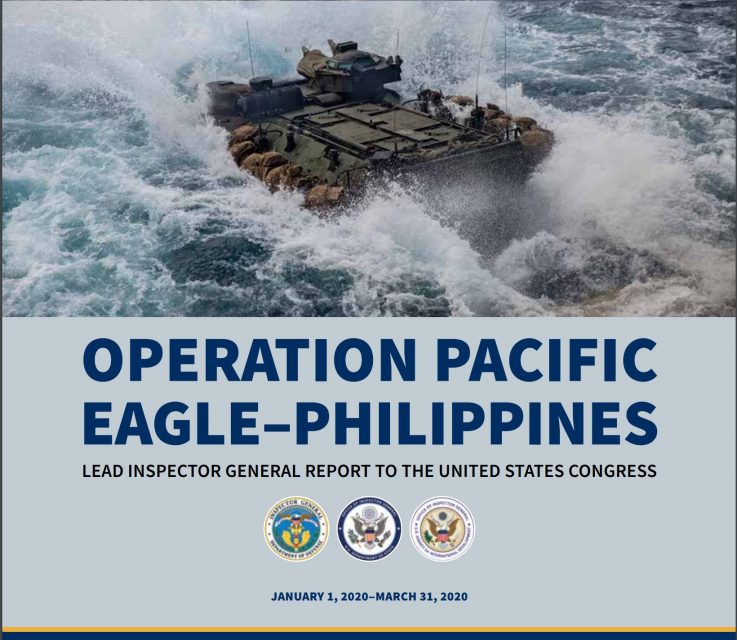US Embassy “questioned AFP’s capacity to conduct sustained counterterrorism operations” amid pandemic, says Pentagon report

(Eagle News) — The United States’ Department of Defense said that the Philippine government’s decision to end the Visiting Forces Agreement will “likely present new challenges for US counterterrorism operations.”
In the latest report by the US “Lead Inspector General (Lead IG)” to the US Congress, it said that the end of the VFA could complicate US operations in the East Asia region.
The 10th quarterly report on Operation Pacific Eagle-Philippines (OPE-P) noted “the overseas contingency operation” being done by the US military “to support the Armed Forces of the Philippines’ fight against ISIS-East Asia (ISIS-EA) and other terrorist organizations.”
“The full implications of VFA termination are not yet known, but it will likely present new challenges for U.S. counterterrorism operations,” it said.
The report “summarizes significant events related to this operation and describes ongoing and planned Lead IG and partner agency oversight work, and covers the period from January 1, 2020, to March 31, 2020.”
“The Philippine government announced that it would terminate its Visiting Forces Agreement (VFA) with the United States effective August 9, 2020, absent any action in the interim to reverse this decision. The VFA has provided for expedited, visa-free entry into the Philippines for U.S. military personnel and equipment since 1999,” it noted.
The VFA also governed criminal jurisdictions for U.S. service members accused of criminal acts in the Philippines.
-US says COVID-19 pandemic limited AFP capacity to do counterterrorism work-
In a release summarizing the US report presented by Acting Inspector General Sean W O’Donnel of the US Department of Defense, it noted that the “coronavirus disease–2019 (COVID-19) pandemic limited the Armed Forces of the Philippines’ (AFP) counterterrorism activities toward the end of the quarter.”
It said that the US Embassy in Manila had concerns about the Philippine military’s capacity to do “sustained counterterrorism operations” amid the COVID-19 pandemic.
“The Philippine government entered into a ceasefire with communist rebel militants as AFP resources were diverted to pandemic response efforts. The U.S. Embassy in Manila questioned the AFP’s capacity to conduct sustained counterterrorism operations simultaneously while confronting the pandemic,” stated the US Lead Inspector General for Operation Pacific Eagle-Philippines Quarterly Report to the United States Congress.
The report was publicly released on May 12.
It said that the U.S. government had already “committed $4 million to COVID-19 response efforts in the Philippines this quarter.”
“These efforts include assisting the Philippine government with infectious disease prevention and response strategies, COVID-19 testing, and the delivery and management of medical supplies, including personal protective equipment,” it said.
The US report also noted that before the COVID-19 outbreak, the Philippine military had already engaged in minor clashes with ISIS-connected terrorists in the southern Philippines.
“Prior to the COVID-19 outbreak, the AFP engaged in minor clashes with ISIS-EA in the southern Philippines. A week-long AFP offensive resulted in the deaths of at least 14 ISIS-EA militants and 4 AFP soldiers. In a follow-on assault against a nearby ISIS-EA camp, AFP troops seized firearms, ammunition, and improvised explosive devices,” it said in its report to US Congress.
The US Defense report by the Lead Inspector General also explained how the US Special operations forces in the country were able to rescue five wounded Philippine soldiers in Mindanao.
“U.S. special operations forces provided casualty evacuation assistance to the AFP this quarter, rescuing five AFP soldiers who were wounded while conducting operations on Mindanao,” it said.

The termination of the bilateral military agreement, which was signed in 1999, will go into effect on August 9. The deal gave US forces access to Philippine territory for a range of activities but notably retained jurisdiction over soldiers that committed crimes in the country to be tried by US military tribunals.
The decision is part of a series of tit-for-tat measures that saw the US deny visas to Philippine politicians purportedly – although denied by Washington – over Manila’s detention of human rights lawyer and politician Leila de Lima.
(with a report from Sputnik)








